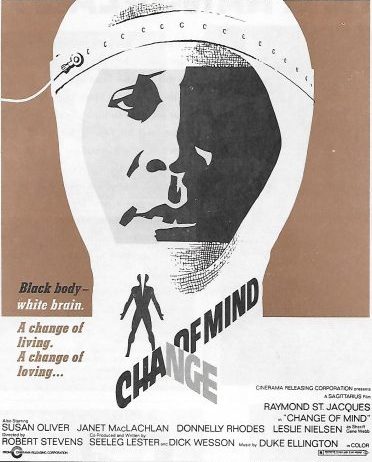 Back in 1969 a young Roger Ebert wrote that CHANGE OF MIND is “never as bad or tasteless as it could have been.” I’d argue that, on the contrary, it is every bit as bad as it could have been, although I do agree that it’s not nearly as tasteless as its premise suggests—and that’s a shame, as exploitation is something it could have used (it actually predated the so-called “Blaxploitation” film cycle by 2-3 years).
Back in 1969 a young Roger Ebert wrote that CHANGE OF MIND is “never as bad or tasteless as it could have been.” I’d argue that, on the contrary, it is every bit as bad as it could have been, although I do agree that it’s not nearly as tasteless as its premise suggests—and that’s a shame, as exploitation is something it could have used (it actually predated the so-called “Blaxploitation” film cycle by 2-3 years).
A vehicle for the late actor Raymond St. Jacques (1930–1990), CHANGE OF MIND got “lost” for several decades, only to turn back up in the late 2010s on a Dutch TV broadcast (meaning the print being streamed on the internet contains Dutch subtitles and a distracting logo in the upper right hand corner).
Following a 3 minute opening credits sequence, depicting a half black-half white billiard ball rolling through a maze, we cut in on a brain surgery (complete with an off-screen narrator filling us in on what’s happening). It seems the surgery is intended to save the life of David Rowe, a white DA with terminal cancer whose brain is being transferred to the head of Ralph Dixon, a recently deceased African American. The operation is a success and David/Ralph gets sent home, none the worse for wear.
David’s new life as a black man is marked by racism both subtle and overt. His wife Margaret can’t bring herself to touch—much less have sex with—him, and his colleagues are distant. Nor does David get much satisfaction from visiting the wife of Ralph, whose body he now inhabits; she has very little to say, and his black mistress is even less forthcoming. His only real solace is in a court case in which he’s charged, ironically, with defending a racist white man (played with maximum ham by Leslie Nielsen).
Directed by episodic TV ace Robert Stevens (1920–1989), whose final feature this was, CHANGE OF MIND fails as both science fiction and a BLACK LIKE ME (1964)-esque racial drama. The film, for the record, directly anticipates Melvin Van Peebles’s comedy WATERMELON MAN (1970), but doesn’t live up to it, being completely lacking in comedy (even of the unintentional variety), while the expected social commentary is present but feels halfhearted. It certainly doesn’t help matters that in the final third the proceedings inexplicably devolve into a straight, and none-too-exciting, courtroom drama.
One worthwhile aspect is the innovative soundtrack, which adroitly weaves in snatches of Duke Ellington jazz music. Another is the acting by St. Jacques, who gives the film far more class than it deserves, as does Susan Oliver as his wife. Those things, however, aren’t enough to make up for the many, many defects; truly, this is one lost film whose discovery wasn’t worth the wait.
Vital Statistics
CHANGE OF MIND
Sagittarius
Director: Robert Stevens
Producers: Seeleg Lester, Richard Weston
Screenplay: Seeleg Lester, Richard Wesson
Cinematography: Arthur Ornitz
Editing: Donald Ginsberg
Cast: Raymond St. Jacques, Susan Oliver, Janet MacLachlan, Donnelly Rhodes, Leslie Nielsen, David Bailey, Andre Womble, Jack Creley, Cossette Lee, Clarisse Taylor, Larry Reynolds, Hope Clarke, Rudy Challenger, Henry Ramer, Franz Russell, Joseph Shaw, Sydney Brown
